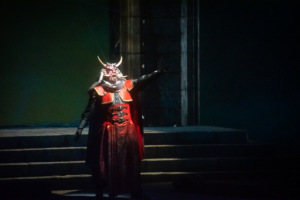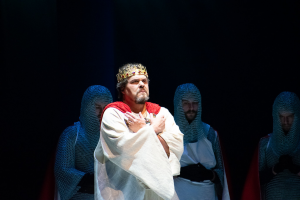
“Parsifal” Courtesy of IU Jacobs School of Music. Used with permission.
Colossal. Enormous. Gigantic. Mere words cannot adequately describe the monumental size, scale and scope, much less the brilliance, of Richard Wagner’s towering epic opera “Parsifal.” I made the trek to Indiana University Bloomington to see the production, presented by the Jacobs School of Music at the Musical Arts Center, for its opening performance on Sunday.
The four-hour opera has a storied history with Jacobs School of Music Opera Theater, which regularly produced it from the 1940s through the 1970s, partly cementing its world-renowned reputation. To celebrate IU’s Bicentennial in 2020, the school is reviving Wagner’s masterpiece after a 43-year hiatus.
A story of redemption, Wagner’s final opera, first performed in Germany in 1882, is based on Arthurian knight Parsifal’s quest for the Holy Grail. Composed by Wagner as a sacred music festival drama, it is filled with religious and ethical messages. Replete with enchanted castles, forests, magic and miracles, it is considered one of the most “unique, demanding and engrossing works in the operatic repertoire.” according to a Jacobs School of Music news release.

“Parsifal” Courtesy of Sarah J. Slover. Used with permission.
Directed by the award-winning Chris Alexander, IU professor and Atlanta Opera music director Arthur Fagan conducted the always-outstanding Jacobs School of Music Philharmonic Orchestra. Walter Huff served as the choral director.
The visually stunning production features spectacular video, projection and set design by world-renowned artist S. Katy Tucker, costumes by Linda Pisano, and lighting design by Todd Hensley.
It is generally well-known that for singers to perform Wagner, they must have the vocal power to be heard over a large orchestra, while maintaining shading, which is the changing of tones to match the emotion of each word or phrase with varied degrees of volume. Based on what I heard, those who performed principal roles more than met the test. All acclaimed singers with extensive global credits, they included Mark Delavan as Amfortas, Chris Lysack as Parsifal, Mark Schnaible as Klingsor, Kristinn Sigmundsson as Gurnemanz and Renée Tatum as Kundry. Not only did each of these singers demonstrate vocal virtuosity, their respective dramatic performances were impressive as well.
Also, collectively turning out exemplary performances were the Jacobs’ students who made up the chorus. I especially enjoyed the Act 2 scene at Klingsor’s castle, during which the female flower maidens unsuccessfully attempt to seduce Parsifal.

“Parsifal” Courtesy of Sarah J. Slover. Used with permission.
A lot is made of the length of “Parsifal.” Depending on whether you are a dyed-in-the-wool opera fan, an occasional attendee or a total novice, the five-hour extravaganza (there is a 45-minute and a 25-minute intermission) is either a valuable time investment or an endurance test, depending on your level of interest. Wagner’s towering work, which is sung in German has English subtitles. For those not used to following them, they can be a drawback. Though exquisitely solemn, the music is also very slow, as is the action. In reality, “Parsifal” may be too tedious for some in this modern age of short attention spans, fed by lightning-speed film, TV and Internet content. The plot itself can be perplexing if you’re not familiar with the libretto, so I would recommend to go online before you go and do some basic research or read the synopsis in the printed program as you are waiting for the curtain to go up. For those who are Wagner aficianados, however, your experience will be sublime.
Some consider “Parsifal” a once-in-a lifetime experience and I concur. There is a reason IU Opera Theater has the stellar, world-class reputation it does. Without a doubt, there is no better illustration of this first-class brand than the impeccable artistic quality of its production of “Parsifal.”
There is one more performance of IU Opera Theater’s “Parsifal” on Saturday, Nov. 16 at 6:00 p.m. For tickets call (812) 855-7433.





